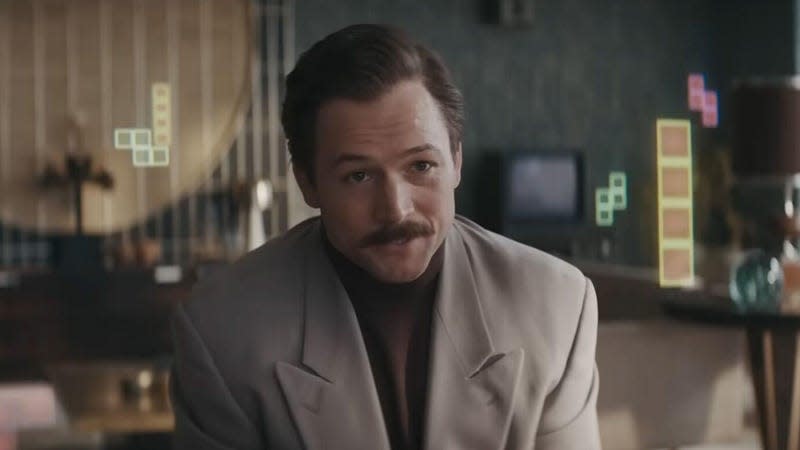Tetris review: video game origin story (mostly) falls into place

Early in Tetris, as the film establishes the stakes of its based-on-a-true-story narrative, a character offers an important observation about the fledgling video game’s impact: He played it for five minutes yet he still sees its signature falling blocks in his dreams. It’s an observation that anyone who’s spent time with Tetris over the last 35 years can probably grasp, and within the context of the film it serves to emphasize just how seismic the game’s immediate impact was. This wasn’t just a video game, the film tells us. This was a little slice of perfection so compelling that it could change our brains.
It’s with this idea firmly in mind that Tetris, directed by Jon S. Baird from a script by Noah Pink, sets out to tell the story of one man’s tireless quest to bring the game to the masses amid a swirl of cutthroat dealmakers, Soviet agents, and Cold War tensions. Set amid a tumultuous time for the USSR and the video game industry, the film frames itself as a combination of origin story, biopic, and conspiracy thriller. It doesn’t always work, and sometimes the film gets boxed in by its own conceit, but the story of how one of the world’s favorite games landed on a global stage is fun enough, and tense enough, that it’s still worth playing.
Read more
Great directors, terrible films: The biggest misses from Hollywood's heaviest hitters
From whoa to woe: Ranking Keanu Reeves’ 20 best performances (and 5 of his worst)
Tetris largely follows the saga of the game’s growth from a Russian programmer’s hobby project to worldwide phenomenon through the eyes of Henk Rogers (Taron Egerton), a game designer and publisher who plays the game at the Consumer Electronics Show in 1988 and immediately sees its potential on the worldwide market. Transfixed by the game and its simple elegance, Henk makes a deal to publish and sell Tetris in Japan, but soon finds that the British media empire that holds the rights is primed to play hardball, particularly when word gets out about a world-changing new handheld device called the Game Boy.
After betting his reputation, his company, and his financial future on the success of Tetris, Henk has no choice but to go to Russia and try to convince the game’s creator, Alexey Pajitnov (Nikita Yefremov), that he’s a capitalist worth trusting. Of course, the Russian government is not necessarily open to this idea, and Henk’s presence in the Soviet Union soon sets off a chain reaction that could put much more than his money in danger.
Thus begins the film’s balancing act between Henk’s Steve Jobs-esque evangelism for the game, and the lengths he’s willing to go to wrest Tetris from the hyper-protective, isolationist Soviet machine. The film’s first act works to convince us that the game is worth fighting for, while the rest of the story takes us into the heart of Moscow at a time when tensions within the Soviet Union are high, and the whole Communist bloc is on the verge of crumbling. With that environment established, Baird and Pink ratchet up the tension, as Henk is repeatedly warned to leave Russia even as others start to close in on stealing the landmark deal from under his nose.
What the film never quite manages to do is serve any one of these narrative threads completely beyond simply telling us how Tetris became Tetris. We get most of each story, and what we get is well-executed, but the film’s two-hour runtime leaves a lot of emotional and thematic threads dangling. As much as we come to understand Henk’s tenacity, we never learn what it is about him that makes him so willing to take such an enormous risk. His story feels half-written, as does the story of Pajitnov’s attempts to reconcile his sense of duty with his sense of creativity and freedom. Painting Tetris as one of the driving forces that precipitated the Soviet Union’s collapse doesn’t help matters, not because they’re not interesting, but because they feel half-baked, like part of a buggy game that came out of development too quickly.
Tetris — Official Trailer | Apple TV+
But what the film lacks in completeness and narrative satisfaction it makes up for in pure energy. Egerton, a reliably game actor who seems to dive headlong into every role he gets, is the driver of that energy, giving Henk the twitchy aura of a man with his back to the wall who is nevertheless still looking to the stars. Yefremov effectively conveys the fire behind the Tetris creator’s warm eyes, while Oleg Stefan is wonderful as a government official caught between dealmaking and toeing the Communist party line. The trio works together wonderfully, weaving endearing humanity into a story that’s often occupied with shady men in black cars and puffed-up executives trying to win through sheer force of monetary might.
Which isn’t to say those black cars and ruthless executives don’t spin magic of their own. Everything in Tetris works, to a point, and Baird’s command of the story’s thriller elements helps push the film into the realm of pure entertainment, even when the cultural observations and thematic punches the film’s trying to land don’t connect perfectly. There’s a great deal of fun to be had here, even if the story is never quite as addictive as the game that inspired it. Tetris doesn’t cast the same spell as its namesake, but it will at least make you look at those falling blocks in a new way.
(Tetris arrives March 31 on Apple TV+)
More from The A.V. Club
Sign up for The A.V. Club's Newsletter. For the latest news, Facebook, Twitter and Instagram.

 Yahoo Movies
Yahoo Movies 
